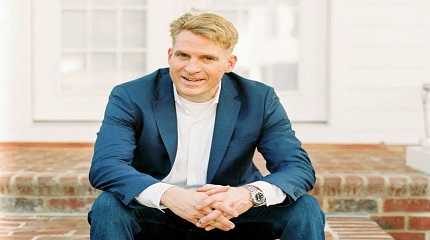
CHARLOTTE, N.C. (AP) — A North Carolina business magnate has been indicted again on federal criminal charges, this time on accusations that he conspired to skim large amounts of money from his insurance companies, then lied about it to regulators to hide the scheme with two co-conspirators.
A 13-count grand jury indictment in Charlotte was filed Thursday against Greg E. Lindberg of Durham, whom federal prosecutors allege has defrauded thousands of policyholders, news outlets reported.
“The indictment reveals a carefully orchestrated scheme that relied on a web of complex financial investments and transactions designed to evade regulators, disguise the financial health of Lindberg’s insurance companies, and conceal the alleged purpose of the scheme: Lindberg’s personal gain,” western North Carolina U.S. Attorney Dena King said after the indictment was made public Friday.
The counts include wire fraud, conspiracy, money-laundering conspiracy, making false insurance business statements to regulators and making false entries about insurance business finances.
Lindberg, 53, already is facing in the fall a retrial on federal charges accusing him of attempting to bribe North Carolina’s insurance commissioner to secure preferential regulatory treatment for his insurance business. Before the 2019 indictment on these charges, Lindberg had given millions of dollars to North Carolina candidate and party committees and independent expenditure groups.
An appeals court last June overturned those 2020 corruption-related convictions, and soon after he was released from an Alabama prison where he had been serving a seven-year sentence. With the latest indictment, an arrest warrant was issued Thursday for Lindberg.
A Lindberg spokesperson called the latest charges “piling on” by the government because it has a weak case against Lindberg at retrial. An appeals court panel ruled the trial judge erred by giving jurors in Lindberg’s trial misleading instructions before they began deliberations.
According to prosecutors and the latest indictment, Lindberg and others agreed from no later than 2016 through at least 2019 to defraud insurance companies, other third parties and policyholders. In 2017-18 Lindberg and his co-conspirators used loans and related transactions to skim “hundreds of millions of dollars” from his insurance companies to buy and operate other Lindberg firms, the indictment alleges.
Lindberg deceived the state Insurance Department and other regulators and improperly used insurance company funds for his personal benefit, the government alleges. Lindberg allegedly personally benefited by using company funds to finance “his lavish lifestyle” through real estate purchases and forgiving over $125 million in loans from his affiliated companies to himself, according to a U.S. Justice Department release.
Lindberg spokesperson Susan Estrich said the “the latest charges stem from the government’s spending over five years going through over 7 million documents on literally thousands of complicated financial transactions involving over 900 companies and handpicking alleged technical violations which have not caused any loss to policyholders in North Carolina or any other state for that matter.”
Estrich also provided a statement from Lindberg, who said: “I invested over $500 million in my insurance companies. I never took a penny of dividends. The allegation that I somehow defrauded them while investing $500 million in them and taking no dividends is entirely absurd.”
Last August, the U.S. Securities and Exchange Commission filed a civil complaint against Lindberg, an associate and their investment advisory firm of defrauding clients out of over $75 million through complex schemes involving undisclosed transactions.
And in December, that associate – identified as Christopher Herwig – pleaded guilty in Charlotte federal courts to conspiracy to defraud the United States related to a scheme to move money between insurance companies and other businesses Lindberg owned.
Herwig is identified as one of the two co-conspirators in this week’s indictment of Lindberg. The other alleged co-conspirator — identified as Devin Solow — had been formally accused by federal prosecutors of conspiracy in a bill of information unsealed last month. But Solow’s attorney and King’s office also wrote that the government and Solow had entered a deferred prosecution agreement whereby the bill would be dismissed in five years if Solow complies with the agreement, which includes promising to cooperate with prosecutors.




